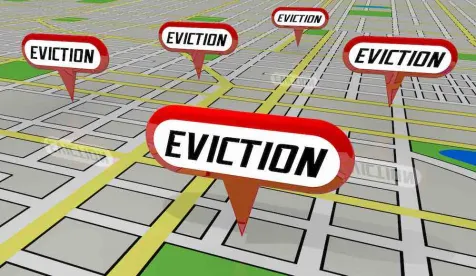Since the COVID-19 pandemic began, many tenants have seen their revenues plummet or disappear entirely as a result of state and local regulations on whether they could operate, when, and at what capacity.
Many commercial landlords have attempted to work with their tenants and avoid eviction by entering into agreements that deferred rent or accepted temporary partial payments. These arrangements pose risks for landlords because if a tenant files for bankruptcy protection, some of those payments could have to be repaid to the bankruptcy trustee because they are "preferences" under the Bankruptcy Code.
At the end of 2020, to combat the continuing effects of the COVID-19 pandemic, Congress passed the Consolidated Appropriations Act of 2021 (CAA). The CAA amends the Bankruptcy Code to protect commercial landlords (and vendors/suppliers) from preference claims. The amendment applies to late payments made under agreements entered into on or after March 13, 2020. It incentivizes landlords to provide payment deferments to their tenants by eliminating the fear of a trustee clawing back payments as preferences if the tenant files bankruptcy. The amendment makes it easier for landlords to help their distressed tenants avoid shuttering their operations forever.
Preference Actions Generally
The Bankruptcy Code allows a trustee to avoid and recover "preference" payments to creditors within 90 days of the bankruptcy filing. The reason is to prevent aggressive collection activity in the shadow of bankruptcy.
Not all payments before bankruptcy are preferences. A preference payment is defined by Section 547 of the Bankruptcy Code as:
-
Payment on an “antecedent” (i.e., a debt accrued in the past rather than the present) debt;
-
Made while the debtor was insolvent (that is when the debtor's assets were less than the debtor's liabilities);
-
To a non-insider creditor, within 90 days of filing the bankruptcy; and
-
That allows the creditor to receive more on its claim than it would have, had the payment not been made and the claim paid through the bankruptcy proceeding.
Payments meeting these criteria must be repaid to the trustee, even if they were originally paid to the creditor in good faith. Following repayment of these payments to the trustee, the creditor may file an unsecured proof of claim against the debtor. But the creditor, at best, will receive a pro rata recovery with other unsecured creditors that, in the typical Chapter 7, amounts to less than 10 cents on the dollar.
Creditors familiar with the Bankruptcy Code often avoid doing business with distressed companies if they know they are in the zone of insolvency to minimize the risk of having to return payments or litigate with a trustee. The new preference protection provided under subsection 547(j) seeks to alleviate this common creditor concern.
New Preference Protection under Subsection 547(j) of the Bankruptcy Code
The CAA adds section 547(j) to the Bankruptcy Code to encourage payment relief from landlords (and vendors/suppliers) for the remainder of the pandemic. It grants preference protection to landlords of non-residential real property and to vendors/suppliers of goods and services who received deferred payments from debtors after March 13, 2020 (under an earlier agreement or arrangement). The new subsection will remain effective for two years, expiring on December 27, 2022, but will apply to any bankruptcies filed before then.
Under Subsection 547(j), the trustee is prevented from recovering the following payments made before the bankruptcy as a preferential payment (although the amount paid to the creditor is subject to a payment cap):
-
"payment of rental arrearages" in connection with an "agreement or arrangement" made between a commercial landlord and tenant on or after March 13, 2020 "to defer or postpone rent and other periodic charges" and
-
"payment of supplier arrearages" in connection with an "agreement or arrangement" made on or after March 13, 2020, between a company and a "supplier of goods or services to defer or postpone the payment of amounts due under an executory contract for goods and services."
Preference claims can be fact-intensive and complex. Even if you do everything "by the book" and are unaware of a customer's insolvency, you could still have to defend against a preference action. If your business receives a demand letter from a bankruptcy trustee for the return of alleged preference payments, you should consult with an attorney knowledgeable about preference claims and defenses.




 />i
/>i

